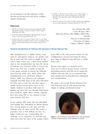 11 citations,
September 2021 in “Journal of molecular endocrinology”
11 citations,
September 2021 in “Journal of molecular endocrinology” ERβ has potential in treating prostate cancer and neurodegenerative diseases, but human studies are needed before clinical use.
9 citations,
September 2018 in “JAAD Case Reports” Lichen planopilaris can be triggered by prolonged scalp traction and can be treated with corticosteroids.
 9 citations,
August 2013 in “Facial Plastic Surgery Clinics of North America”
9 citations,
August 2013 in “Facial Plastic Surgery Clinics of North America” Recognize and treat hair loss conditions that mimic androgenetic alopecia by identifying warning signs and using proper tools.
 8 citations,
May 2017 in “IUBMB life”
8 citations,
May 2017 in “IUBMB life” Astrotactin proteins are important for brain and skin development and are linked to several neurodevelopmental disorders.
 6 citations,
July 2015 in “Dermatology practical & conceptual”
6 citations,
July 2015 in “Dermatology practical & conceptual” Feily's method prevents scalp necrosis in dense hair transplants by allowing time for blood flow to return before grafting.
 6 citations,
May 2013 in “Dermatologic Surgery”
6 citations,
May 2013 in “Dermatologic Surgery” FUE can be successfully done on African-American hair by using larger punch tools and careful techniques to reduce hair damage.
 5 citations,
August 2019 in “International Journal of Women's Dermatology”
5 citations,
August 2019 in “International Journal of Women's Dermatology” The document concludes that it's important to recognize and treat hair loss in women of color, considering their unique hair characteristics and psychological impact.
 5 citations,
February 2019 in “The New England Journal of Medicine”
5 citations,
February 2019 in “The New England Journal of Medicine” Certain mutations in the PADI3 gene may increase the risk of developing a type of scarring hair loss common in women of African descent.
5 citations,
December 2002 in “The journal of investigative dermatology. Symposium proceedings/The Journal of investigative dermatology symposium proceedings” Skin cells might help spread prion diseases like Creutzfeldt-Jakob disease.
4 citations,
January 2022 in “Cosmetics” Avoid high-tension styles and use professional treatments to reduce hair damage and health risks.
 4 citations,
November 2021 in “Biomedicines”
4 citations,
November 2021 in “Biomedicines” New digital tools are improving the diagnosis and understanding of irreversible hair loss conditions.
 4 citations,
August 2018 in “Clinical Endocrinology”
4 citations,
August 2018 in “Clinical Endocrinology” Women with PCOS have more insulin resistance and are more likely to have heart-related health issues, with insulin resistance being a bigger factor than β-cell problems.
 4 citations,
April 2017 in “International journal of reproduction, contraception, obstetrics and gynecology”
4 citations,
April 2017 in “International journal of reproduction, contraception, obstetrics and gynecology” The study concluded that a higher waist-hip ratio significantly increases the risk of metabolic syndrome in women with PCOS.
 4 citations,
November 2016 in “Journal of Cutaneous Pathology”
4 citations,
November 2016 in “Journal of Cutaneous Pathology” Three characteristics of plasmacytoid dendritic cells help tell apart lupus-related hair loss from LPP.
 2 citations,
May 2024 in “Journal of science and medicine in sport”
2 citations,
May 2024 in “Journal of science and medicine in sport” Exercise is crucial for managing polycystic ovary syndrome (PCOS) and improving overall health.
 2 citations,
October 2023 in “Philosophical transactions - Royal Society. Biological sciences”
2 citations,
October 2023 in “Philosophical transactions - Royal Society. Biological sciences” Enzymes that change arginine to citrulline are important for skin barrier and hair formation, and their malfunction can lead to skin conditions and hair disorders.
 2 citations,
February 2023 in “Journal of The American Academy of Dermatology”
2 citations,
February 2023 in “Journal of The American Academy of Dermatology” Scalp biopsies greatly improved diagnosis and treatment for Black women with unclear alopecia.
 2 citations,
February 2021 in “The Journal of clinical and aesthetic dermatology”
2 citations,
February 2021 in “The Journal of clinical and aesthetic dermatology” Understanding the cause of bitemporal hair loss is key to deciding the right treatment.
 2 citations,
March 2019 in “JEADV. Journal of the European Academy of Dermatology and Venereology/Journal of the European Academy of Dermatology and Venereology”
2 citations,
March 2019 in “JEADV. Journal of the European Academy of Dermatology and Venereology/Journal of the European Academy of Dermatology and Venereology” Hair loss in elderly people is often due to health issues and needs better diagnosis and treatment.
 2 citations,
June 2016 in “Dermatologic Clinics”
2 citations,
June 2016 in “Dermatologic Clinics” Dermatologists often neglect hair disorders due to complexity and lack of clear treatments, impacting patient care and highlighting the need for better education and interest in this area.
 2 citations,
January 2016
2 citations,
January 2016 Hair restoration surgery can lead to issues like scarring, hair loss, and anxiety, but careful management before and after the procedure can minimize these complications.
 1 citations,
June 2022 in “PubMed”
1 citations,
June 2022 in “PubMed” Alopecia causes hair loss and should be treated early, especially scarring types where hair cannot regrow.
 1 citations,
April 2022 in “International Journal of Women's Dermatology”
1 citations,
April 2022 in “International Journal of Women's Dermatology” Classifying curl patterns might help doctors assess and treat hair loss better.
 1 citations,
October 2021 in “Cosmoderma”
1 citations,
October 2021 in “Cosmoderma” Hair transplants can work for permanent hair loss if the condition is stable and done carefully.
 1 citations,
February 2021 in “International journal of reproduction, contraception, obstetrics and gynecology”
1 citations,
February 2021 in “International journal of reproduction, contraception, obstetrics and gynecology” Polycystic Ovary Syndrome (PCOS) is common in infertile women and obese women with PCOS have more severe ovulatory problems, needing more care.
 1 citations,
April 2019 in “Endokrynologia Polska”
1 citations,
April 2019 in “Endokrynologia Polska” Healthy diet and exercise are important for women with PCOS to manage weight and metabolic issues, and supplements like omega-3, vitamin D, and inositol may help.
 1 citations,
July 2018 in “Elsevier eBooks”
1 citations,
July 2018 in “Elsevier eBooks” FAPD and possibly CCCA may be AGA subtypes, and treatments combining antiandrogens, hair growth agents, hair transplants, and anti-inflammatories could be effective.
 1 citations,
January 2018 in “Pediatrics in review”
1 citations,
January 2018 in “Pediatrics in review” A 7-year-old boy with a brain tumor developed early puberty, which was successfully treated with medication.
 1 citations,
November 2014
1 citations,
November 2014 The document explains hair and nail biology, common hair loss conditions and treatments, oral and genital skin diseases, and the risks and treatments associated with squamous cell carcinoma.
 1 citations,
January 2013 in “International Journal of Trichology”
1 citations,
January 2013 in “International Journal of Trichology” The conference discussed various hair disorders and treatments, including the use of topical steroids, high doses of cetrizine, and hair grafting, as well as the psychological impact of hair loss.



























